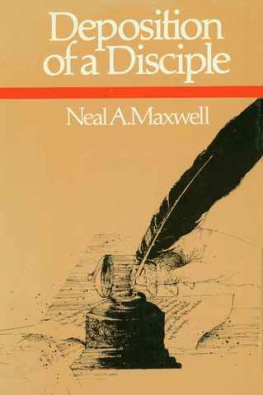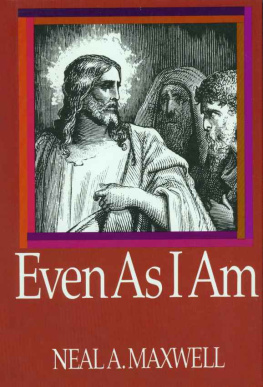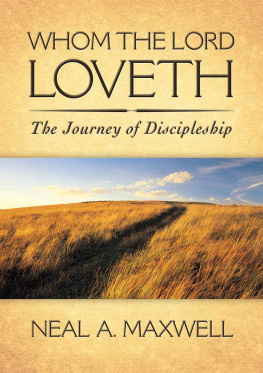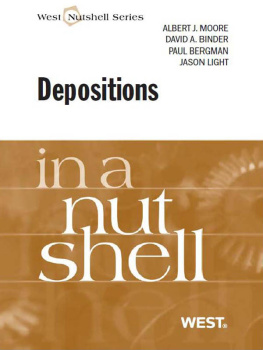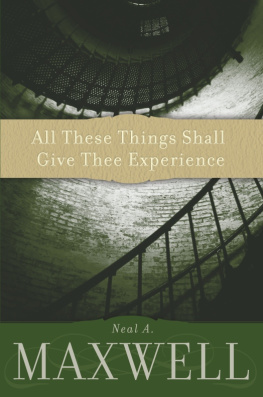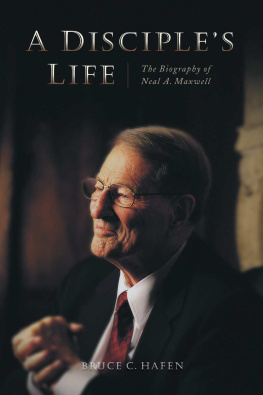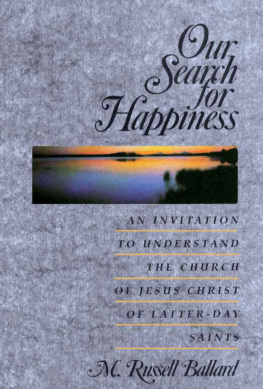Deposition of a Disciple
Neal A. Maxwell
1976 Deseret Book Company All rights reserved. No part of this book may be reproduced in any form or by any means without permission in writing from the publisher, Deseret Book Company, P.O. Box 30178, Salt Lake City, Utah 84130. This work is not an official publication of The Church of Jesus Christ of Latter-day Saints. The views expressed herein are the responsibility of the author and do not necessarily represent the position of the Church or of Deseret Book Company. Deseret Book is a registered trademark of Deseret Book Company.
Preface
Often members or near members of The Church of Jesus Christ of Latter-day Saints, youth and young adults in particular, ask me (in the words of Peter: 1 Peter 3:15) for "an answer" and "a reason" explaining my testimony or my beliefs. They seem to seek not a sermon so much as a probing inquiry as a means of obtaining the "what" and "why" of beliefs. However inadequate my responses are, my intent is to "strengthen [my] brethren in all [my] conversation." (D&C 108:7.) The questions thus asked are not like the questions Zeezrom put to Amulek with a desire to confound. Almost always the questions are asked for the best possible reason: in order to get an answer. (Alma 11.)
This undertaking is a series of direct answers or depositions responding to actual questions often put to me in correspondence in question-and-answer formats or are representative of concerns advanced in private conversations. The giving of a deposition suggests a formal, legal setting, of course, which this book is not. But a deposition is a way of preserving testimony, a device for discovering and eliciting evidence.
A major caveat about what this book is not is in order. The questions treated here are of such an order that volumes could be written about most. This format obviously permits no definitive development of answers and the responses make no such pretense. The format lends itself to some flexibility as to topics and a somewhat conversational style. Brief responses, therefore, are not an attempt to be glib, but to give some concise reasons and insights into the author's views. My answers and reasons are not of the high quality Peter urged, but are given, as Peter suggested, "with meekness and fear."
The device of using two questioners suggests two types of questions: first, those from the First Questioner, or Questing Believer (the true believer), who seeks additional counsel, and, second, those of the Second Questioner, or Near Believer, who probes and presses because he wants to believe but also does not want to be "taken in."
The author's hope and deep prayer is that the answers presented here will be a stimulus for the reader and will help him in further formulating his responses to the realities of life by using the marvelous and emancipating gospel of Jesus Christ.
Acknowledgments
Deep appreciation is expressed to Elizabeth Haglund, Daniel H. Ludlow, Oscar W. McConkie, Jr., and Gary Gillespie for not only reacting to the manuscript but for also providing me with encouragement and helpful suggestions. Such friends are able to see a manuscript not only for what it is, but for what it has the possibility of becoming. Similar encouragement and help came from Wm. James Mortimer, Lowell M. Durham, Jr., and Eleanor Knowles.
First Session
First Questioner: Since a belief in a literal devil is so unfashionable in this age, how much a part of the gospel of Jesus Christ is a belief in the reality of Satan?
The Disciple: Very crucial. Fashion first undercut belief in the literalness of the devil and then sought to undercut belief in the literalness of Jesus Christ. The one prepared the way for the other. When the adversary can get us to disbelieve in but serve him and to disbelieve in but not serve the Lord, he has achieved a double coup. The adversary doesn't mind being thought of as anachronistic, belonging to another age, if he can control this one.
Second Questioner: But wasn't he merely role playing in the preexistence? Why should his punishment be so severe? After all, he was "an angel in authority in the presence of God," a "Son of the Morning." Didn't that entitle him to proffer his own proposal?
The Disciple: It's extremely important to get straight what happened in that premortal council. It was not an unstructured meeting, nor was it a discussion between plans, nor an idea-producing session, as to how to formulate the plan for salvation and carry it out. Our Father's plan was known, and the actual question put was whom the Father should send to carry out the plan. (Abraham 3:27.)
Lucifer knew about this plan, and his very pleading was real rebellion. The scriptures tell us plainly that he sought a throne above the stars and God. (2 Nephi 24:13.) Therefore, he was from the beginning a serious rebel. President George Q. Cannon said, "He was our brother, sitting side by side with our Redeemer, having equal opportunities with him. But he rebelled. He turned against the Father because he could not have his own way." This council was no abstract exercise. It reflected a deep, deep difference. Lucifer, by what he did, told us much more about himself than about his so-called offer. Clearly, he was already becoming an outsider, using (and trying to profit from) an insider's information.
First Questioner: You see no virtue in Lucifer's wanting at least to save everyone?
The Disciple: He wanted glory, not growth; control, not salvation. His ascendancy meant more to him than our agency. The devil is a despot. Incidentally, G. K. Chesterton defined despotism in a way that applies here. He said despotism is a "disease of public spirit," a "drunkenness of responsibility" in which despots have a "wild desire to manage everything." Chesterton said despotism trusts men "too little."
Being a poor loser, Lucifer transferred his battle to this world, where he displays his "wild desire to manage everything." The casualty rate in the premortal world was 33 percent, and Satan's harvest will be high here in the second estate. Thus what we see about us is a protracted psychodrama reenacting his power play of the premortal world. He wanted status without service, power without perfection ("I will be like the Most High"), and esteem not earned. Sodom was one of Satan's "finest" hours!
Second Questioner: Isn't that an altogether too simple explanation of the evil in life?
The Disciple: Simple only in the sense that the gospel of Jesus Christ is simple. Just because something is simple does not mean it is untrue. Jacob warned about the danger of preferring complexity, of "looking beyond the mark," and of seeking a tangled theology that people "cannot understand." (Jacob 4:14.)
Let me stress that either becoming morbidly preoccupied with the devil or ignoring his reality is equally unhealthy. The literally hundreds of references to him in all five books of scripture (and in the utterances of modern prophets) validate his reality. We also know where the territorial line is which we must not cross; Lucifer is permissive on most things, but not on granting passports for citizens to leave his realm.
First Questioner: Don't people simply make choices rather than always being drawn by the devil? Are there not some ideas and impulses that originate only with man?
The Disciple: Yes. The Lord distinguishes between the "doctrines of devils" and "the commandments of men." (D&C 46:7.) One may be more sinister than the other or more invidious in its motivation, but the consequences of following an incorrect principle are the same, regardless of its source.

